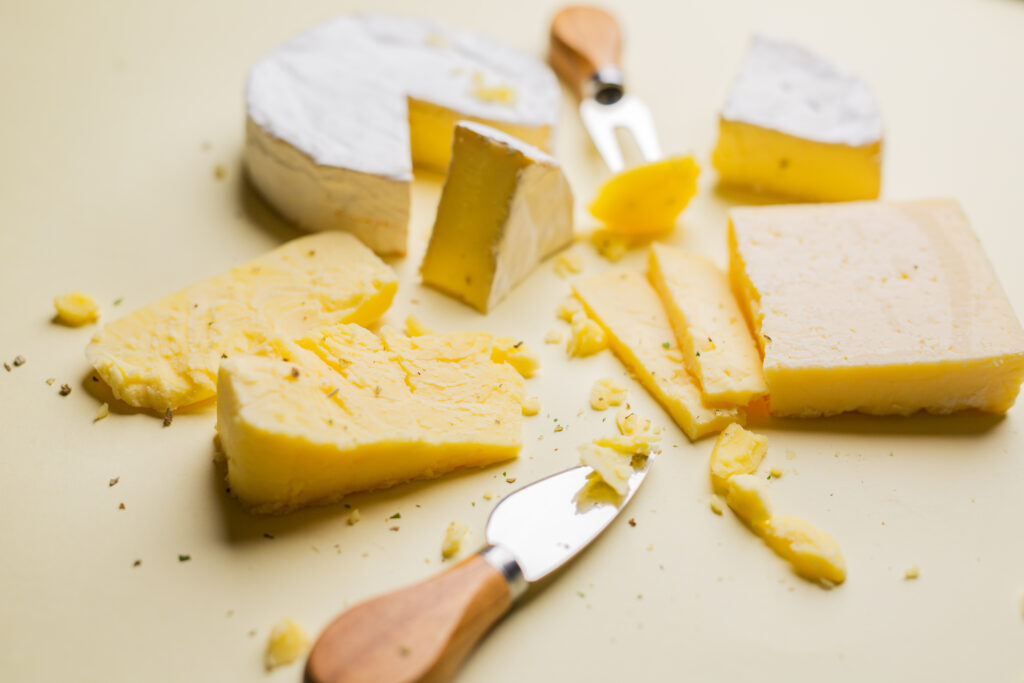As a follow up from my article on gluten and women hormones (you can find the article here), I thought I would also address dairy for women hormones. The general recommendation by most health professionals is that both gluten and dairy should be removed from the diet. Dairy and gluten have become demonised in the health and wellness hormone space. As usual, I wanted to examine the evidence that we have on dairy and women hormones. Unlike gluten, dairy has been studied for hormones specifically so there is more data to work with. Before I begin my article I want to admit my bias and say that I am plant-based so generally do my best to avoid dairy. I can not call myself a strict vegan because I still do enjoy some feta cheese from time to time and I am not strict about avoiding dairy while travelling, but for the most part, all other sources of dairy have been removed from my diet. None of the recipes on my blog contains dairy of any kind.
Dairy is one of the most common allergens and intolerances either due to the inability to digest dairy sugars like lactose or galactose or dairy proteins like whey or casein. For people with a confirmed dairy allergy or intolerance and for anyone who believes they are reacting to dairy it is advised to get tested and if confirmed avoiding or minimising dairy is generally recommended. It is unquestionable that people that have a true dairy allergy or intolerance will suffer from hormone imbalance by means of inflammation. Galactosemia is a genetic intolerance to galactose (a metabolite of lactose) found in dairy products which are usually detected at birth. Galactosemia is rare but it is a confirmed cause of premature ovarian insufficiency leading to early menopause and associated health consequences (13). Similarly, certain gene mutations in some women mean a compromised ability to digest lactose and galactose leads to an increased risk of developing ovarian cancer as galactose becomes “toxic for the ovary” (14). We also know that certain population groups are more prone to lactose intolerance than others. African and Asian population groups have a 75%-95% lactose intolerance rate while European populations have only an 18%-26% lactose intolerance rate (14). Usually, women with a true dairy intolerance will see dramatic improvements to their overall health within days or weeks of removing dairy. However is it necessary for the population as a whole to avoid dairy for overall health and hormone balance?
The main claims about dairy being bad for women’s hormones include:
- Dairy is inflammatory
- Dairy contains hormones (namely estrogens and IGF1)
- Dairy causes period pain
- Dairy causes acne
Many health professionals also claim that consuming A2 dairy is a better choice than regular A1 dairy as it is less inflammatory and therefore less likely to interfere with women’s hormones.
Does dairy cause inflammation?
The majority of research on dairy and inflammation shows no evidence that dairy is inflammatory. A review of 15 different randomised trials has found no evidence for dairy raising inflammatory biomarkers in the body. The review took into account both healthy adults and adults that already had inflammatory conditions such as diabetes and obesity (1). In actual fact, the review noticed a weak trend towards the anti-inflammatory effects of dairy (1). There is some evidence showing mild inflammatory effects of dairy however these studies generally highlight the difference between yogurt (being slightly anti-inflammatory) and cheese (being sightly pro-inflammatory) (2). It is clear from the research that dairy has not been found to be as inflammatory overall compared to other food groups such as processed meats, sugar, especially sugar-sweetened beverages like soft drinks and deep-fried foods (3).
Is dairy loaded with hormones and do these hormones affect our biology?
In short yes dairy does contain hormones, even dairy that has no added hormones still contains hormones naturally, namely, it contains, prolactin, IGF1, estrogens, progesterone, prostaglandins, corticosteroid hormones like cortisol and androgens like testosterone and others (4). For the most part, it is believed that non-steroid hormones like prolactin and prostaglandins (which are responsible for pain) degrade quickly are unlikely to exhibit biological action when consumed although results are mixed (4). It is unclear how much Insulin-like growth factor (IGF1) is absorbed from dairy however IgF1 is associated with acne and is present in higher amounts in women with PCOS (5). Of all the hormones present in dairy, steroid hormones have been found to be the most problematic, in particular, dairy estrogens are thought to have profound effects on human biology. We have studies showing that 60-80% of all dietary estrogens consumed come from dairy products (4). Dairy is a high source of real estrogen that has the same effect as our own estrogenic hormones (unlike plant estrogen which have a different effect on our biology, you can read my article about phytoestrogens here). How dairy estrogens affect each individual is variable but we know that a common reaction is estrogen dominance which leads to heavy and painful periods, PMS and mood swings, painful breasts and more. The dose of hormones in dairy is very small. It is estimated that it is around 6000 times less than the amounts of hormones we produce in our own bodies, however, dairy estrogen has been found to have profound effects on human biology (both males and females) even at very small doses (4). This could be a possible explanation as to why there is an increased risk of developing breast cancer with increased milk consumption that has been observed in some studies (15).
Does dairy cause period pain?
Anecdotally many women have found a reduction in period pain by removing dairy from the diet. As noted above we can see that dairy does contain prostaglandins (pain signalling molecules that are responsible for period pain) although these degrade quickly when consumed so are unlikely to create period pain. We can also see that dairy contains estrogens which help to build the uterine lining and therefore can lead to heavier periods. Heavy periods can be associated with more painful periods however, this is not true for all women as heavy periods can also be painless. Interestingly evidence examining the direct association between dairy and dysmenorrhea (period pain) have shown opposite results. We have four studies examining the direct link between dairy and period pain which have found that there is no association and in fact, even showed a reduction in period pain among women, this was likely due to the high calcium content of dairy (6) as we know that calcium is beneficial for women for diminishing PMS related symptoms including pain (7).
Does dairy cause acne?
A systematic review and meta-analysis on dairy and acne concluded that “intake of any dairy, any milk, full-fat dairy, whole milk, low-fat/skim milk, and yogurt regardless of amount or frequency was associated with a higher odds ratio for acne compared to no intake in individuals aged 7–30 years ” (8). Dairy has also been shown to raise insulin (9) as well as IgF1 (10). Both insulin and IgF1 are known to drive acne by promoting androgenic hormones like testosterone in women which have a direct impact on this skin. Interestingly it is unlikely due to the presence of IgF1 in milk or dairy products but rather from the presence of certain amino acids in milk that make the liver produce more IgF1 (10). It should be noted that dairy is not the only dietary cause of acne, refined carbohydrates like sugar, saturated fat and deep-fried foods also have a strong association with acne (11).
Is A2 dairy better for hormones?
Most of the research on dairy and hormones is conducted on regular dairy which is usually A1 dairy. A1 dairy is thought to be inflammatory because of the release of the BCM-7 opioid peptide which is released during digestion (12). Although the effects of BCM-7 have been studied there are no specific studies on how the peptide affects hormones directly. The effects seem to be mostly localised to the digestive tract causing a digestive upset in some people. This may have indirect effects on hormones. We have minimal research examining A2 dairy and hormones specifically however we know that the A1 and A2 are casein proteins. Casein is a known dairy allergen for many people which has been associated with many negative health outcomes including neurological conditions and cancer. For individuals with a casein sensitivity A2 dairy is digested differently and can be a lot easier to tolerate. It can be an option for those struggling to digest casein but not wanting to remove dairy completely. For the rest of the population that has no adverse reaction to dairy, I can not find any direct evidence suggesting A2 dairy is better for hormones or inflammation on the whole. More research is needed, however, I do believe that issues in digesting casein are much more common than we realise and is the main reason many women (but not all) experience improvements in hormonal health when removing dairy.
To conclude
Women with a known lactose or casein sensitivity/allergy will have hormonal imbalances by means of inflammation. Avoiding dairy or choosing low lactose options or A2 dairy for casein sensitivity can be very helpful. For otherwise healthy individuals that have no known intolerance, we have no evidence that dairy causes widespread inflammation. Dairy does contain hormones in small doses however most of the hormones degrade quickly and are unlikely to exhibit biological effects with the exception of estrogen. Estrogens found in dairy can have profound effects on human biology even at small doses. Dairy has not been shown to cause period pain but dairy can cause acne by means of raising insulin and IGF1. This is most important for women struggling with PCOS. From the evidence I have examined, it seems clear that dairy can affect hormones but not to the extent that we are often lead to believe. Dairy will affect some women more than others. From a health perspective only (not getting into ethics) dairy is not necessary and can be thoughtfully replaced in the diet but there may be room for a small amount of good quality dairy in the diet if one chooses to consume dairy.
References
1.https://pubmed.ncbi.nlm.nih.gov/31089732/
2.https://pubmed.ncbi.nlm.nih.gov/31504094/
3.https://www.ncbi.nlm.nih.gov/pmc/articles/PMC5872783/
4.https://www.ncbi.nlm.nih.gov/pmc/articles/PMC4524299/
6.https://www.karger.com/Article/Pdf/495408
7. https://www.ncbi.nlm.nih.gov/pmc/articles/PMC5313351/pdf/ogs-60-100.pdf
8.https://www.ncbi.nlm.nih.gov/pmc/articles/PMC6115795/
9. https://pubmed.ncbi.nlm.nih.gov/15531672/
10. https://pubmed.ncbi.nlm.nih.gov/29084194/
11.https://pubmed.ncbi.nlm.nih.gov/26203267/
12. https://pubmed.ncbi.nlm.nih.gov/23576048/
13.https://www.ncbi.nlm.nih.gov/pmc/articles/PMC5758462/










